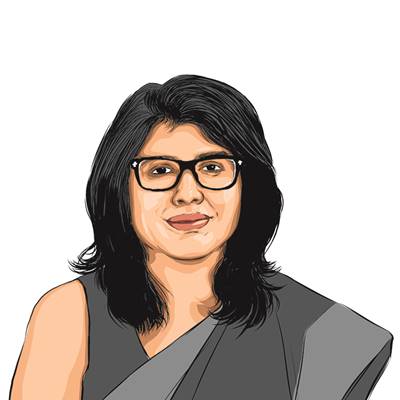Opinion Pal do pal ka shayar: Where is the poet in cinema?
At some point of time in our history – I think it might be the 1980s – the word “kavi” began to lose its halo. By the end of the 1950s, the ruins of that halo had already become visible – in Pyaasa, Guru Dutt names his poet “Vijay” with a mix of melancholy and irony
 The history of this ejection of the poet from the Hindi film song and the English literature department is similar and simultaneous.
The history of this ejection of the poet from the Hindi film song and the English literature department is similar and simultaneous. It must be a kind of secret devotion — and not professional insecurity — that makes me nervous about the disappearance of the word “shayar” from Hindi film songs. Long after I finished watching All We Imagine As Light, the figure of Manoj, the doctor who writes poems secretly, kept returning to me. It might be circumstantial sorority that gives the film its fragile energy, but the shy doctor is kept outside the perimeter of empathy, rejected by the nurse he’s come to like.
A little less than half a century ago, in a film called Kabhi Kabhie, a young poet was singing “Main pal do pal ka shayar hoon”. Touched by the awareness that the life of inspiration and the residency of listening is often as brief as the lyric poem and its impulse, he ended his song with the realisation: “Mujhse behetar kehne wale/ Tumse behetar sunne wale” (Poets better than me, listeners better than you).
At some point in our history — I think in the 1980s — the word “kavi” began to lose its halo. By the end of the 1950s, its ruins had already become visible. In Pyaasa, Guru Dutt names his poet “Vijay”. The victory in Vijay’s name is neither hope nor history, it’s a record of a moment when the poet is on the verge of becoming a relic. The masculinity in the word, taken to be natural through centuries after Valmiki and Vyasa, was being replaced with another stereotype, a man desperately in search of a patron who could be a publisher or reader. A figure of mockery, derided in everyday conversations with couplets such as “Kobi kobi bhaab, kabyer obhab” (behaves like a poet, can’t write verse), they were no longer indulged as misfits.
At least half a century before what Dubravka Ugrešic would characterise as “karaoke culture” — when all consumers of art would also turn into its producers — the Bengali poet Jibanananda Das, otherwise shy and reticent, would begin his treatise on poetry with an announcement: “Shokolei kobi noy, keu keu kobi” (Not everybody is a poet, only a few are). It’s a statement that confers as much legitimacy as it denies. Figures like him, the English professors writing poetry in their inherited languages, would no longer be welcomed or appreciated in literature departments, particularly the English department, whose modular infrastructure would reject the poet and — soon enough — even poetry.
The history of this ejection of the poet from the Hindi film song and the English literature department is similar and simultaneous. The poet Robin Ngangom would call this an attack by “the pushy postmodernists”, the lack of enthusiasm for a packaged literary theory among poets characterised as a handicap. In the Hindi film Saajan (1991), whose release coincided with the inauguration of economic liberalisation in India (and perhaps also the institutionalised import of a Euro-American literary theory into the country’s English literature departments), the poet Aman, played by Sanjay Dutt, writes under the pseudonym “Saagar” and finds himself conflicted about revealing his identity to two people, both of whom can actually be seen as arms of market forces — the woman he loves, who also owns a bookstore and the patron whose family has adopted him. In Pyaasa, the poet was displaced from the stage by the publisher, the reason he had to sing: “Yeh mehlo, yeh takhto, yeh taajon ki duniya” from the back of the auditorium. In Saajan, the woman mistakes the patron for the poet and falls in love with him. It is the best summary of both the disappearance of the poet and the literary culture we find ourselves in: Where the entrepreneur is more powerful than the poet.
The poet has been replaced by the novelist, the shy confidence of the “shayar” who denies being a poet (Main shayar toh nahi …) is gone. In his place we have an Indian English novelist called Vikram Sethi who, we discover at the end of the film, has murdered his publisher. The film is called Ittefaq (2017), meaning coincidence. This substitution of the poet by the storyteller isn’t a coincidence. It is now our history, for which all of us — the stockbroker and the politician, the insurance agent and the publisher, the academic and the policeman, and, of course, poets themselves — will have to hold ourselves accountable.
Roy, a poet and writer, is associate professor at Ashoka University. Views are personal




